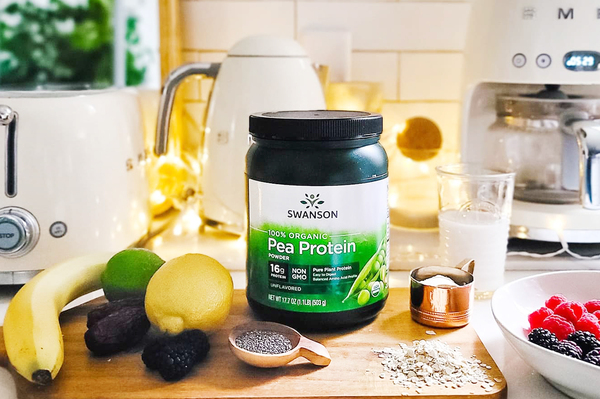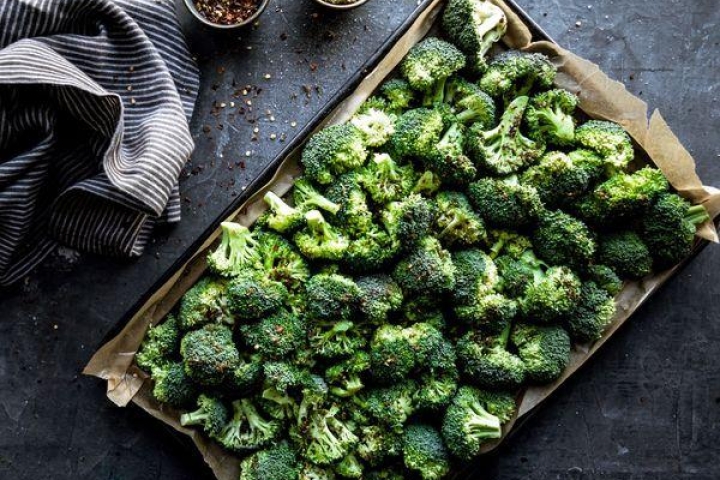What is Pea Protein? Benefits and Uses
When Mom said, “Eat your vegetables,” she knew what she was talking about. Peas, like many other foods, contain proteins, one of the essential building blocks of our bodies. Proteins perform much of the work in our cells; our tissues and organs depend on them for function and structure.1 As we age, our bodies require extra help to synthesize muscle, making proteins a crucial part of our diets and a popular supplement choice, especially for older adults.
One particular type of protein that has garnered a lot of positive attention recently is pea protein.
Pea Protein Benefits
Made from your garden-variety pea, these proteins include all of the essential amino acids that your body can’t produce on its own,2 although methionine is present at lower levels. Because of this, they can help fill dietary gaps and support other health benefits. Here are a few additional advantages of pea-based supplements:
- Easily digestible — with no common sources of digestive distress2
- Vegan — an excellent choice for those who prefer to avoid animal products in their diet2
- Gluten and lactose free — a convenient option for people with these allergies or sensitivities2
- Naturally high in iron3
- Avoids potential risk factors associated with red and processed meats2,4
- May help you feel fuller longer after eating2
As a protein source, these supplements offer a better balance of essential amino acids than proteins derived from hemp seed, rice, and most other grains.4 Despite containing all 9 essential amino acids, their methionine content is slightly too low to be truly considered a “complete” source of protein.5
Pea Protein vs. Whey Protein
Whey protein has enjoyed great popularity as a dietary supplement, and with good reason. Both pea and whey proteins are excellent sources of protein, versatile, and easy to integrate with other foods or beverages. Both can help you build muscle. However, whey protein (which is derived from cow’s milk) is not suitable for everyone. Here’s why:
- Plant vs. animal — Pea protein is plant-based, making it an excellent choice for vegetarians and vegans2
- Non-dairy product — Protein derived from peas avoids concerns for those who are lactose intolerant or simply prefer to abstain from milk products2
- Flavor — It has a mildly raw and earthy flavor, in contrast to the bland and milky taste of whey protein
- Texture — It is commonly described as smooth and creamy, whereas whey protein is a thin, milk-like liquid
- Processing — Mechanical methods can be used to separate pea proteins, while whey protein undergoes chemical separation
- Gluten — Both pea and whey proteins themselves contain no gluten, though gluten is sometimes added to whey protein powders6
Pea protein can help you build muscle, especially when combined with resistance training. However, it doesn’t provide as much methionine as its whey counterpart. Thus, whey protein may be the optimal choice, particularly for those who can tolerate milk products and are looking to build muscle.5 For those with dietary restrictions, pea protein is an excellent alternative.
The Side Effects of Pea Protein
Pea protein is generally well tolerated and gentle on the stomach. It is free from all the most common allergens.5 Pea protein should not be used by those who have a demonstrated allergy to peas.7 As always, consult with your doctor before taking any new supplements.
Who Should Take Pea Protein?
Because of its many benefits and very limited side effects, pea protein is especially suited to those who:
- Are vegan or vegetarian
- Have common food allergies
- Experience digestive issues
- Desire a high-protein option
- Prefer a creamier texture
If you’re looking to supplement your protein intake while respecting dietary restrictions, pea protein may be an excellent choice. By providing proteins that your body cannot produce on its own, it can help you maintain a healthy body and meet your nutritional goals.
You be well, now.
BubbForest
*These statements have not been evaluated by the Food and Drug Administration. These products are not intended to diagnose, treat, cure, or prevent any disease.
Sources
- What are Proteins and What Do They Do? Read source
- The Current Situation of Pea Protein and Its Application in the Food Industry. Read source
- Iron Rich Foods. Read source
- Pea Protein is Everywhere, Is it Healthy? Read source
- Pea Protein vs Whey: Which is Better? Read source
- Is Whey Gluten-Free? Read source
- Pea Protein Food Allergy Labeling. Read source





Leave a comment